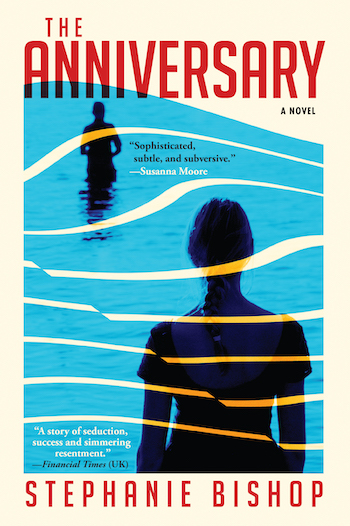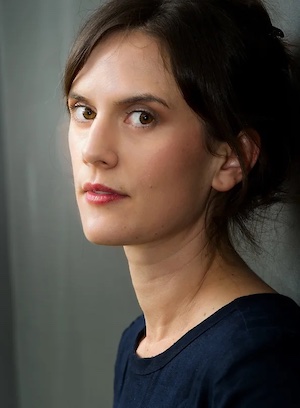Book Review: “The Anniversary” — A Smart and Entertaining Mystery
By Ed Meek
Stephanie Bishop does a great job withholding information and she is also good at tying together the narrative’s many loose ends.
The Anniversary by Stephanie Bishop. Grove Atlantic (Black Cat), 432 pages, $18.

If you are making a list for summer reading, you can’t do much better than Stephanie Bishop’s The Anniversary. It’s a novel that combines a deep dive into writing along with a mystery. As a work about an author at work, Anniversary fits into what is becoming a genre. We appear to like pulling back the curtain to see how the wizard does it. Recent examples include Julia May Jones’s Vladimir, in which a writer confronts political correctness at the college while seducing a younger man, and Pola Oloixarac’s Mona, in which a writer attends a writing conference while trying to figure out what caused the bruises on her body. Then there’s the HBO series This May Destroy You about a writer trying to get to the bottom of a rape she can’t quite remember while completing a manuscript. And before that, HBO’s Girls revolved around Lena Dunham’s character, a writer, as she and her friends dealt with toxic males while trying to survive in NYC.
The Anniversary is about a woman writer named JB Blackwood who has just found out that she is receiving a prestigious prize for her new novel. Maybe it’s the Booker Prize or even a Pulitzer (she doesn’t say). This comes after years of working in the shadow of her famous husband, Patrick, who makes award-winning films. He is twenty years older than she is; they met when she was a student of his. He became her husband and her mentor. As long as she was unsuccessful, he is very supportive. But once she begins to rival him and maybe even surpass him in stature, he has a difficult time with it. Sound familiar? This is a well-worn plot. In A Star is Born, Bradley Cooper nurtures the unknown Lady Gaga until she belts out a few show stopping numbers and upstages him, which tips him into a downward spiral. In Michael Chabon’s The Wonder Boys (a great novel and film about writing) the main character, (Michael Douglas in the movie) is out-shined by one of his students at the annual college writing festival.
For their anniversary, our narrator decides to take her husband on a romantic cruise to get their relationship back on track. I’m not giving anything away to say that after a round of great sex and too much alcohol, a storm at sea arises. Husband Patrick ends up going over the railing from the upper deck into the cold waters of the ocean in the middle of the night! Even the narrator is somewhat unsure of what really happened. The next few hundred pages are spent delving into her past, her family’s, and her relationship with her husband, in order to figure out what happened and how she arrived in this situation.

Author Stephanie Bishop. Photo: Craig Peihopa
JB’s relationship with her husband happens to involve collaborative writing. She helps him with his films; he helps her with her novels. Bishop is good at explaining how collaboration can work and what the narrator’s writing process entails. She brings up questions about the reliability and unreliability of our memory and the connection between fiction and reality. Much of JB’s writing is closely based on real life and that can cause problems. Hemingway is reputed to have lost half a dozen famous friends when The Sun Also Rises came out. There’s an old axiom: be careful what you say to a writer. It may end up in a story. The narrator’s perspective on this issue is different from her husband’s and it is the basis for conflict.
In addition, the stories we tell ourselves shape our perspective on life. A new movement in psychology believes that people can retell their stories about themselves in ways that will help them accept themselves and their fate. If you are always berating yourself for not living up to your standards or your mother’s or father’s or society’s, maybe you just need to change the narrative. In The Anniversary, the narrator finds her perspective on herself, and her husband, shifting and that changes both the past and the present.
Bishop does a great job withholding information. You keep turning the pages, though you might find yourself skimming paragraphs that may have benefited from some trimming. She is also good at tying together the narrative’s many loose ends. Still, Mark Twain said: “The only difference between reality and fiction is that fiction needs to be credible.” Mysteries often strain our sense of credibility, and Bishop runs into problems when she leaves the subjective world of writing and ventures into the more objective world of law. But these days the real world has become pretty iffy — did ChatGPT write this? Is Tik Tok used for spying? Was Michelle Carter responsible for her boyfriend’s suicide because she sent him a text? You may not care to quibble all that much about what is or not tenable when it comes to this smart, entertaining novel.
Ed Meek is the author of High Tide (poems) and Luck (short stories).
